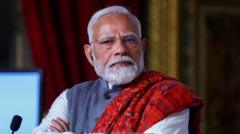However, beneath the warm exchanges lies a need for both leaders to address the transactional aspects of their relationship. As Modi prepares for his meeting, Delhi has already initiated concessions like lowering tariffs, repatriating undocumented Indian immigrants, and increasing imports of American oil. These proactive measures could help mitigate Trump's demands regarding the substantial US trade deficit with India, which has been reported to be around $46 billion in recent years.
Trump may push Modi for additional tariffs reductions and more specific commitments, including taking back the remainder of the estimated 700,000 undocumented Indians residing in the US. Still, Modi is expected to leverage these discussions to propose a bilateral trade agreement that could potentially ease tariffs between both countries. Furthermore, Modi is likely to advocate for US investment in India's nuclear energy sector while emphasizing the need for technological cooperation in key areas.
The discussion is set against the backdrop of evolving global dynamics, including India's strategic partnerships with Iran and its role in broader geopolitical conflicts such as the wars in Ukraine and Gaza. Throughout these complex exchanges, both leaders are likely to aim for an upbeat tone, particularly with hopes of enhancing cooperation through initiatives like the Indo-Pacific Quad, which includes the US, India, Japan, and Australia.
Modi's trip comes at a pivotal moment, with both leaders poised to capitalize on their personal rapport to further a multifaceted partnership that addresses mutual strategic interests. The upcoming dialogue will not only navigate delicate negotiations but also set the tone for future interactions between the world's largest democracies.
Trump may push Modi for additional tariffs reductions and more specific commitments, including taking back the remainder of the estimated 700,000 undocumented Indians residing in the US. Still, Modi is expected to leverage these discussions to propose a bilateral trade agreement that could potentially ease tariffs between both countries. Furthermore, Modi is likely to advocate for US investment in India's nuclear energy sector while emphasizing the need for technological cooperation in key areas.
The discussion is set against the backdrop of evolving global dynamics, including India's strategic partnerships with Iran and its role in broader geopolitical conflicts such as the wars in Ukraine and Gaza. Throughout these complex exchanges, both leaders are likely to aim for an upbeat tone, particularly with hopes of enhancing cooperation through initiatives like the Indo-Pacific Quad, which includes the US, India, Japan, and Australia.
Modi's trip comes at a pivotal moment, with both leaders poised to capitalize on their personal rapport to further a multifaceted partnership that addresses mutual strategic interests. The upcoming dialogue will not only navigate delicate negotiations but also set the tone for future interactions between the world's largest democracies.




















